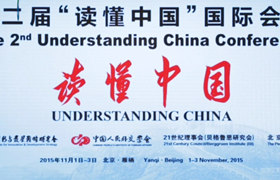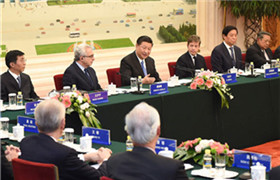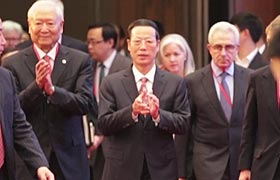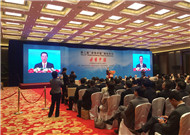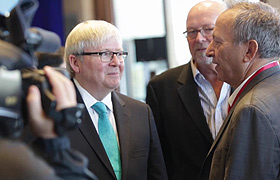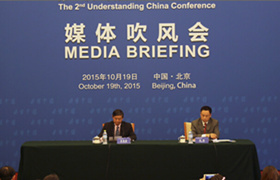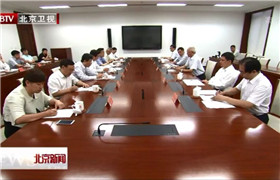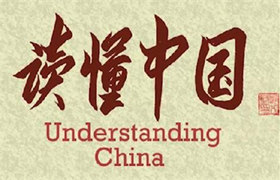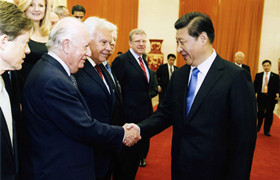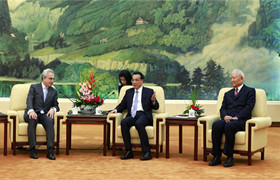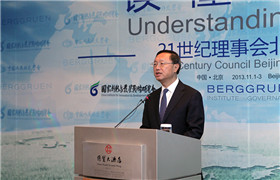- HOME--> Chairman
-
Traditions of the Chinese Civilization and the Communist Party of China
Source:People’s Daily
[1] The article was published in the January 18, 2017 issue of The People’s Daily.
[2] The author is former Executive Vice President of the Central Party School of the CPC and currently Chairman of China Institute for Innovation & Development Strategy.
[3] These well-known words are from “On the New Stage”, a report delivered by Mao Zedong in October 1938.
[4] During the May 4th Movement era, there was a major clash between the Conservatives (i.e., Zhang Shizhao) and Radicals or Westernizers (i.e., Chen Duxiu).
[5] Mao Zedong, 1941, “Refuting the Third Leftist Line”.
[6] Mao Zedong, October 1938, “The Role of the Communist Party of China in the National War”.
[7] lbid.
[8] lbid.
[9] Mao Zedong, January 1940, “On New Democracy”.
[10] Mao Zedong, February 8, 1942, “Oppose Stereotyped Party Writing”.
[11] Mao Zedong described the three phases of the War of Resistance Against Japanese Aggression as follows: In the first phase, China would be on the strategic defensive while Japan would be on the strategic offensive; the second phase would be that of strategic stalemate; and the third and final phase of the struggle would be that of China’s counteroffensive.
[12] Commonly known as “Gujin Zhongwai Fa” (literally “Ancient-contemporary-Chinese-foreign methodology”), it was put forward in “How to Study the History of the Communist Party of China”, a report delivered by Chairman Mao Zedong at a study group of the CPC Central Committee in March 1942.
[13] In “Rectify the Party’s Style of Work” (February 1, 1942), Chairman Mao Zedong said, “Finally, in opposing subjectivism, sectarianism, and stereotyped Party writing, we must have in mind these two purposes: first, ‘learn from past mistakes to avoid future ones”, and second, ‘cure the sickness to save the patient’”.
[14] In “On the Correct Handling of the Contradictions among the People” (February 27, 1957), Chairman Mao pointed out that contradictions among the people could be resolved using the formula of “unity-criticism-unity”. He said, “To elaborate, that means starting from the desire for unity, resolving contradictions through criticism or struggle, and arriving at a new unity on a new basis.”
[15] Here we cite some of the most popular ones. Mencius said, “The people are the most important element in a nation” (“Exhausting the Mind”, Mencius). Confucius said, “The people are the foundation of a country” (“The Book of Documents”, Analects). Book of the Later Han (a Chinese history book of the Eastern Han Dynasty) cited Confucius as saying, “The ruler is the boat, and the people are the water. The water can carry the boat, but it can also upset the boat.”
[16] Mao Zedong, November 15, 1956, “Speech at the Second Plenary Session of the Eighth Central Committee of the Communist Party of China”.
[17] The Jinggangshan Mountains lying in the remote border region of Jiangxi and Hunan Provinces are known as the birthplace of the Red Army.
[18] Located in Hebei Province, Xibaipo Village was the CPC’s base (1947-1948) after retreating from Yan’an. It was the Party’s last rural command post before liberating all of China.
[19] On March 23, 1949, on the eve of leaving Xibaipo for Beiping, Chairman Mao Zedong said, “Today we are heading to the capital to gan kao.” Literally, gan kao means “taking the Imperial Examination”.
[20] The article describes how Li Zhicheng’s dynasty fell because of his extravagances and dissolute way of life after capturing Beijing, capital of Ming Dynasty.
[21] This was the thought of Chairman Mao Zedong for promoting social and economic development.
[22] These referred to contradictions among the people and those between the people and the enemy. The two classes of contradictions were completely different in nature.
[23] Mao Zedong, January 27, 1957, “Talks at a Conference of Secretaries of Provincial, Municipal, and Autonomous Region Party Committees”.
[24] The principle was introduced in the 1950s during the Hundred Flowers Campaign for promoting the arts and sciences and culture.
[25] Mao Zedong, February 27, 1957, “On the Correct Handling of Contradictions among the People”.
[26] The two plenums started off the second breakthrough in the process of Sinicizing Marxism.
[27]“Li Yun” (or “The Conveyance of Rites”) in The Book of Rites postulates two Confucian social ideals. During times of the Grand Union (“da tong”), an ethic of public-spiritedness and mutual care reign in the society. In contrast, during times of Small Tranquility (“xiao kang”), which is the lesser ideal, people are driven more by selfish motives as they care about their own welfare more than that of others.
[28] The principle constitutes the core governance philosophy of the Communist Party of China.
[29] These goals consist of the following: to double the 2010 GDP and per-capita income of the Chinese people and turn China into a moderately well-off society by 2020 (which roughly coincides with the 100th anniversary of the founding of the CPC); to build a well-off, strong, democratic, culturally advanced, and harmonious modern socialist country, and realize the great renaissance of the Chinese nation by the middle of the 21st century (which roughly coincides with the 100th anniversary of the founding of New China).
[30] These comprise of accomplishing the following in a comprehensive way: building a moderately well-off society; deepening reform; governing the nation by law; and governing the Party strictly.
[31] These two are from I Ching (or Book of Changes).
[32] This is based on an oft-quoted line from The Book of Learning (originally a chapter of the Book of Changes), “If you can improve yourself for one day, improve yourself every day, and never cease to do so.”
[33] This originates from an anecdote recorded in the classic Lüshi Chunqiu (or Master Lü’s Spring and Autumn Annals). The idiom warns one against burning bridges, cheating, or dishonoring oneself for short-term gains at the cost of sacrificing the future. It is roughly equivalent to the Western idiom, “Kill the goose that lays the golden eggs”.
[34] In the early 1950s, shortly after the founding of New China, Chairman Mao said, “It is necessary that we handle the relationships in various fields in the nation through consultation.” In “On a Few Issues Concerning the People’s Democracy” (September 1949), Premier Zhou Enlai commented, “The spirit of consultation under New Democracy lies not in what the final vote is but mainly in the process of repeated deliberations and discussions prior to that.”
[35] The Great Learning states, “Things being investigated, knowledge became complete. Their knowledge being complete, their thoughts were sincere. Their thoughts being sincere, their hearts were then rectified. Their hearts being rectified, their persons were cultivated. Their persons being cultivated, their families were regulated. Their families being regulated, their states were rightly governed. Their states being rightly governed, the whole kingdom was made tranquil and happy.”
[36] This is from a work by Wang Tao, who lived in late Qing Dynasty and was translator, reformer, and political columnist.
[37] This is from Mencius.
[38] President Xi has cited the following: “Exalting the virtuous is fundamental to governance” (Mozi); “In governance nothing is more crucial than the appointment of officials” (Zizhi Tongjian); and “Prime ministers must have arisen from among the district-magistrates, and gallant generals must have emerged from among the squads of soldiers” (Han Feizi).
[39] The Confucian idea is conveyed in the Book of Great Learning.
[40] President Xi cited from Analects. Here is the relevant original text: “The Scholar Tsang once said of himself, ‘On three points I examine myself daily, viz., whether, in looking after other people's interests, I have not been acting whole-heartedly; whether, in my intercourse with friends, I have not been true; and whether, after teaching, I have not myself been practicing what I have taught.’”
[41] President Xi made the remark at the 13th group study meeting of the Political Bureau, held in February, 2014.
-
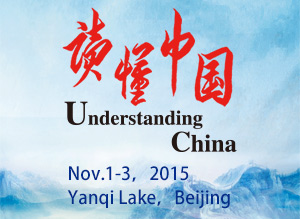
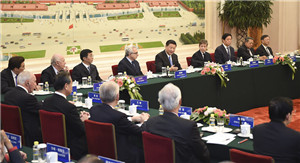
The 2nd "Understanding China" ConferenceOn November 1~3, 2015, the 2nd “Understanding China” Conference was held in Beijing Yanqi Lake International Conference Center. Zhang Gaoli, Vice Premier of the State Council, attended the opening ceremony.
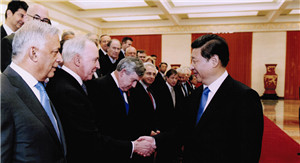
The 1st "Understanding China" ConferenceOn November 1~3, 2013, the 1st “Understanding China” Conference was held in Beijing, which was cosponsored by China Institute for Innovation & Development Strategy (CIIDS), Chinese People’s Institute of Foreign Affairs (CPIFA), and Berggruen Institute on Governance.
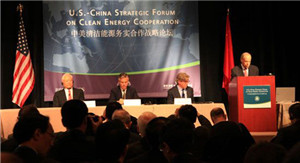
The 2nd U.S.-China Strategic Forum on Clean Energy CooperationWith the “Prospects for U.S.-China strategic cooperation in next decade” as its theme, the forum dwells on the implications of U.S.-China cooperation from the strategic perspective of coping with global challenges and maintaining world peace.
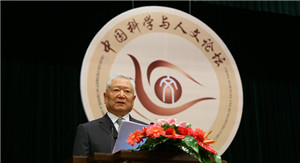
The China Sciences and Humanities ForumCo-initiated in April 2003 by renowned Chinese scientist Mr. Lu Yongxiang and influential political strategist Zhen Bijian, China Sciences and Humanities Forum was jointly hosted by Graduate University of Chinese Academy of Sciences (GUCAS) and the Higher Education Press.

